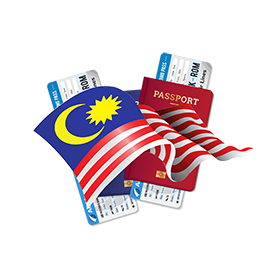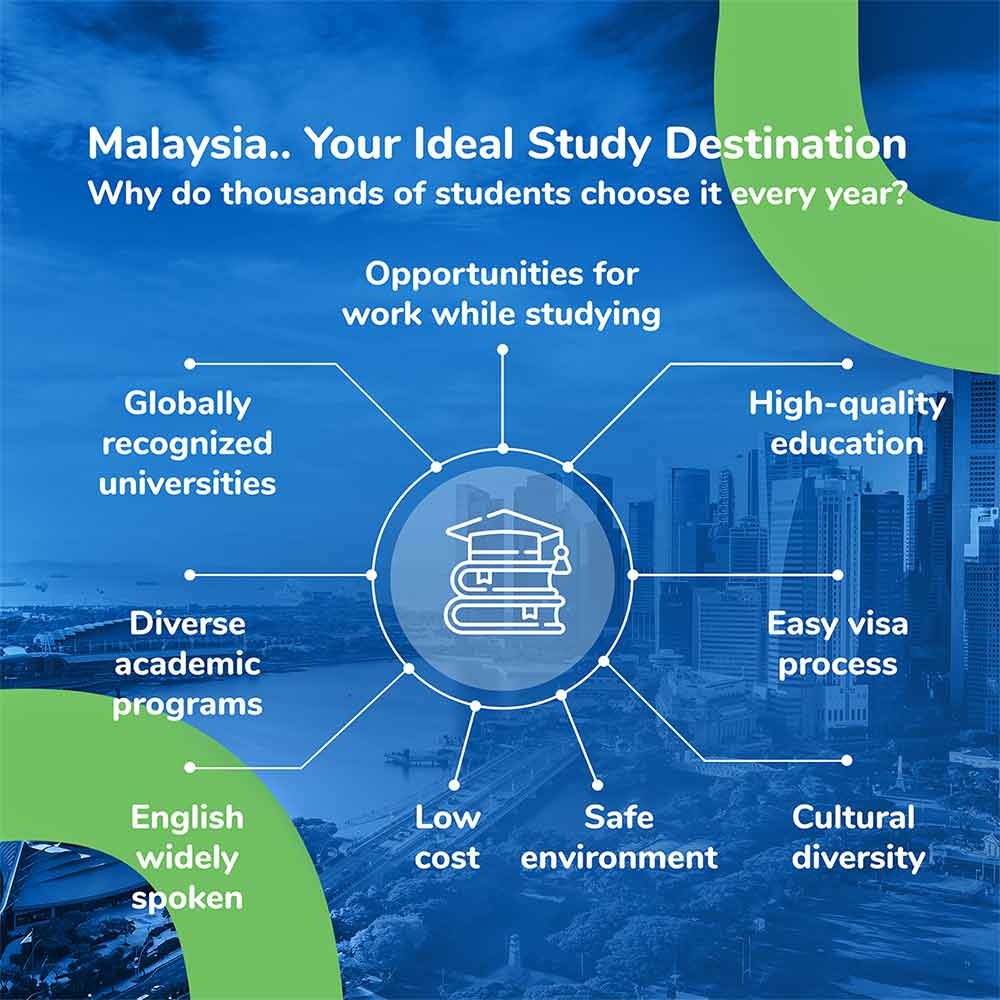Malaysia is rapidly becoming a global hub for higher education, attracting over 170,000 international students from Asia, Europe, Africa, and the Middle East. With its cutting-edge educational model and strategic location in Southeast Asia, Malaysia offers unique opportunities for students to excel academically and experience a vibrant, multicultural environment. Want to study in Malaysia? This guide is your 1st step!
This comprehensive guide will cover the many advantages of studying in Malaysia. You’ll discover why it’s a top choice for international students, with its affordable costs, diverse population, rich culture, and stunning natural beauty.
Why Choose Malaysia as Your Study Destination?
Malaysia offers an array of compelling reasons for international students to choose it as their study destination:
- Affordability: Malaysia is known for its low-cost education. Tuition fees in public universities generally range from $550 to $4,950 per academic year, significantly lower than countries like the US, Canada, UK, or Australia. Living costs are also budget-friendly.
- English Proficiency: English is widely spoken in Malaysia, easing communication for international students. Universities offer many programs taught in English.
- Prestigious Universities: Malaysian universities hold strong positions in international rankings. For example, Universiti Teknologi Malaysia (UTM) ranks 187th globally in the QS World University Rankings.
- Safe and Stable Environment: Malaysia is recognized as one of the safest countries in the world, providing a secure environment conducive to studying.
- World Heritage Sites and Natural Beauty: Explore stunning natural landscapes, historical landmarks, and vibrant cities during your studies.
- Diverse Courses and Specializations: Malaysian universities offer a wide range of programs, including world-renowned specializations in computer science and engineering.
- Branches of International Universities: Reputable foreign universities, such as the University of Nottingham (UK) and Monash University (Australia), have campuses in Malaysia.
- Student Work Opportunities: International students can work part-time (up to 20 hours per week), gaining valuable work experience.

What Can You Study in Malaysia?
Malaysia’s universities offer an impressive array of programs, giving you the freedom to pursue your passions and build a strong foundation for your future career. Here’s a glimpse of the exciting fields you can study in Malaysia:
- Engineering: Delve into specializations like agricultural, architectural, petroleum, computer, civil, mechanical, and software engineering. Some Malaysian engineering programs are recognized among the world’s best.
- Medical Fields: Train to become a doctor, pharmacist, nurse, or other healthcare professional. Malaysia’s growing healthcare sector offers promising career prospects.
- Business and Economics: Gain in-demand skills in accounting, finance, marketing, management, and related disciplines.
- Languages: Master English, the language of global business, or explore other widely spoken languages like Arabic, Chinese, and Hindi. Malaysia’s multilingual environment provides a perfect setting for language learning.
- And More! Malaysia’s universities offer programs spanning many other fields, including information technology, the sciences, social sciences, the arts, and humanities.

Understanding Admission Requirements for Malaysian Universities
Navigating the application process for Malaysian universities requires careful planning and attention to detail. To ensure a smooth and successful application, follow these guidelines:
General Admission Steps
- Choose Your University and Program: Research universities carefully, comparing their programs, strengths, costs, and locations to find the ideal fit.
- Verify Language Requirements: Each university sets its own English proficiency standards (IELTS, TOEFL, PTE Academic, etc.). Check the specific score needed for your chosen program.
- Understand Program Requirements: Know the exact prerequisites for your desired program (e.g., minimum grades, specific subjects studied).
- Gather Documents: Start preparing early. Commonly required documents include:
- High school diploma/Bachelor’s degree and transcripts (translated if necessary)
- Passport and/or birth certificate
- Updated CV
- English proficiency test results
- Proof of scholarships/financial support (if applicable)
- Letters of recommendation (if required)
- Submit Your Application Timely: Adhere strictly to deadlines. Most universities have online application portals. Pay the associated fees.
- Boost Your English Skills: If you need to improve your English, consider English language institutes in Malaysia to better prepare yourself.
- If you do not meet the requirements, a foundation programme can fix that. read all about it in our guide.
Tips for Choosing Your University In Malaysia
- Global Ranking: Factor in the university’s reputation in international rankings (e.g., QS World University Rankings).
- Program Variety: Seek universities with a strong selection of programs in your area of interest.
- Research Focus: If you are passionate about research, choose a university with active research programs and supportive facilities.
- Student Life: Consider factors beyond academics, like student clubs, support services, and the overall campus environment.
Important Note: Each university has specific requirements. Always consult the university’s official website for the most up-to-date and detailed information.
Admission Requirements and Application Process
To successfully apply for admission to Malaysian universities, follow these general steps:
- Choose Your University and Program: Explore university websites and select programs that align with your goals.
- Meet Language Requirements: Demonstrate English proficiency by taking the IELTS, TOEFL, or PTE Academic.
- Prepare Documents: Gather transcripts, passport copies, a CV, letters of recommendation (if required), and proof of financial support.
- Submit Your Application: Apply through the university’s online portal and pay any application fees.
- Apply for Scholarships (If Eligible): Research and apply for scholarships to help offset the costs of studying in Malaysia.
Note: Specific requirements may vary between universities. Always check the official website of your chosen institution for the most up-to-date information.
Cost of Studying in Malaysia
Malaysia’s affordability is a major draw. Here’s a general breakdown of expected costs:
- Tuition Fees (Public Universities):
- Undergraduate: $2750 – $4950 annually
- Postgraduate: $550 – $4400 annually
- Tuition Fees (Private Universities):
- Undergraduate: $1,480 – $10,240 annually
- Postgraduate: $1630 – $3300 annually
- Additional Costs:
- Visa: $230 (one-time)
- Study Materials: $10 – $50 per semester

Cost of Living in Malaysia
- Food: $18 – $25 per day
- Accommodation: Varies depending on location and type of housing.
- Health Insurance: Provided by the university.
- Transportation: Affordable public transportation options available.
- Utilities (Electricity, Water, Internet): Approximately $60 – $85 per month
- Mobile Phone Plan: $5 – $50 per month
Money-Saving Tips When You Study In Malaysia
Managing your finances while studying abroad can be a challenge, but it’s definitely achievable! Follow these practical tips to stretch your budget and thrive in Malaysia:
- Share Accommodation: One of the biggest expenses is housing. Splitting rent with roommates in an off-campus apartment can significantly reduce your costs.
- Become a Home Chef: Eating out frequently gets expensive. Cook more meals at home to save money. Explore Malaysia’s vibrant markets for fresh, affordable ingredients.
- Utilize University Transport: If your university provides transportation services, take advantage of them to save on commuting costs.
- Used Textbook Market: Buy used textbooks and study materials from fellow students to cut down on academic expenses.
- Student Discount Power: Never leave home without your student ID! Many stores, restaurants, and entertainment venues in Malaysia offer student discounts.
- Consider a Part-Time Job: Working part-time, especially during breaks, can boost your income. Make sure to check university guidelines and visa regulations.
Can International Students Work in Malaysia?
Yes, international students are generally permitted to work part-time in Malaysia, but keep these important points in mind:
- University Approval: Many universities allow part-time work, but some have restrictions (e.g., specific industries). Always get approval from your university first.
- Work Guidance: Your university can help you understand the specific laws and procedures for working as a student.
- Visa Validity: You must maintain a valid student visa. Work permissions will be outlined on it.
- Respect Local Laws: Familiarize yourself with all Malaysian laws regarding student employment.
Frequently Asked Questions (FAQs)
Is studying in Malaysia free?
No, studying in Malaysia is not typically free for international students. Costs include tuition, housing, living expenses, and books. However, scholarships may be available, such as those grants provided through the IESCO platform.
Do I need a visa to enter Malaysia?
Most nationalities require a student visa to study in Malaysia. Apply through a Malaysian embassy or consulate, or your chosen university may assist. Citizens of some countries may be eligible for visa-free entry.
Is Malaysia economically poor?
No, Malaysia is a middle-income country with a growing, diverse economy. It’s considered one of the emerging “Asian Tiger” economies and boasts strong industry, agriculture, tourism, and oil and gas sectors. While income inequality exists, Malaysia is not generally considered a poor country.
Is studying in Malaysia difficult?
The difficulty depends on your chosen program, language proficiency, prior preparation, and dedication. Here’s what to consider:
- Program Level: Higher levels (Master’s, Doctorate) and certain specializations are more demanding.
- Language Skills: Struggling with English can create challenges. Language courses may be necessary.
- Preparation: Good prior knowledge in your subject area makes studying easier.
- University Support: Most universities offer resources like preparatory courses and academic advising to help students succeed.

How Can I Travel To Malaysia? Steps?
Follow these steps:
- Valid Passport: Ensure your passport covers the duration of your stay.
- Visa (if required): Apply for the appropriate visa (student, tourist, etc.) based on your nationality and purpose of travel.
- Book Flights: Find a travel agency to help you book flights.
- Travel Insurance: Consider purchasing insurance for emergencies.
- Book Accommodation: Secure housing in advance (hotel, university dorm, apartment).
- Check Health Requirements: Research and comply with any vaccination or health screening requirements.
- Organize Documents: Keep your passport, visa, reservations, and other important documents safe and accessible.
Related: Main Scholarships In Malaysia


